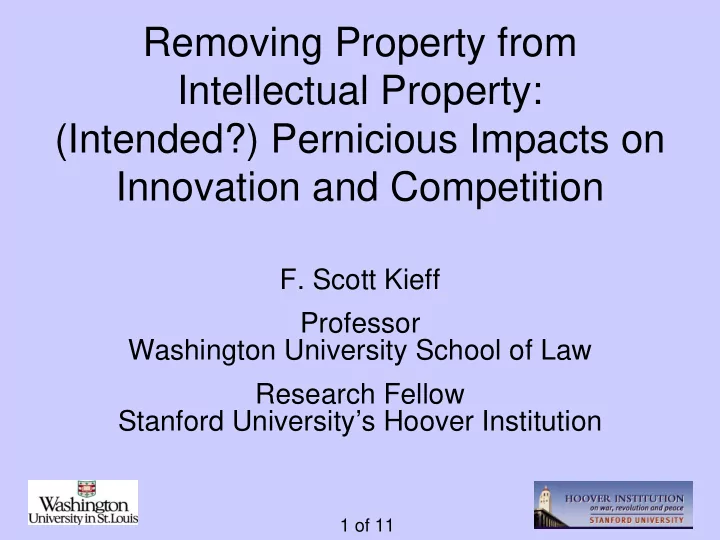

Removing Property from Intellectual Property: (Intended?) Pernicious Impacts on Innovation and Competition F. Scott Kieff Professor Washington University School of Law Research Fellow Stanford University’s Hoover Institution 1 of 11
Popular View Today: Property Rights in IP Cause Problems • Hold ups – stop things from getting done • Hold outs – extract too much, breakdowns, etc. • Buzzwords: trolls, patent thickets, anticommons • Government shutdown and economic collapse – Blackberry’s given to VIP’s to pump brand and get hooked – Then fears of violent withdrawal if crackberries enjoined for even a moment – Our lives and way of life are at stake 2 of 11
Popular Response: Modest Proposals • Just a few targeted uses of “pressure-release-valves” – One or both sides has large number of parties, thereby triggering problems of coordination, free-riding, holdouts, etc. – Even when both sides are each individuals, still face problems of bilateral monopoly, strategic behavior, and cognitive biases – Mixed sized models raise a mix of both problems 3 of 11
Impact: Not So Modest • Focus misses the slight of hand • Like in Jonathan Swift’s story, title is not forthright • Innovation’s discontents have removed property from IP – We had plenty of liability rule release valves already – Now no property (except for large players who don’t need it) – Now some big problems (caused by liability rules) – And getting worse (caused by new contracting rules) 4 of 11
Intuition of the Paper • Liability rules force too many deals – Some deals shouldn’t get done, and a forced “yes” is not a deal – Intervention when disagreement encourages disagreement – Harder for patentee to attract and hold constructive attention of a potential contracting party (can’t hold-in the counterparty) – Removes patentee’s option to terminate the negotiations in favor of striking a deal with a different party (can’t hold-on to option) – Hits small firms worse since big firms have easier time holding-in • Have more $$$ to finance litigation • Have leverage with reputation effects, relationships, bargaining power • New contracting rules block deals – Licensees now can always renegotiate – License to one may now license all 5 of 11
Longstanding Liability Rules (good) • Corporate, bankruptcy, litigation • Uncertainty • Limited experimental use but Hatch-Waxman Act for FDA • Government Immunity 6 of 11
Recent Removal of Property (bad) • Injunctions after eBay (2006)? – Only large players? – Paice v. Toyota not a compulsory license? • Enhanced damages after Seagate – No duty of care, no need to get opinions – Now test may be whether preliminary injunction is granted – But if no permanent injunctions and more uncertainty how will you get preliminary relief? • Experimental use after Merck (2005) – “all uses … ‘reasonably related’ to … information for submission under any federal law regulating…” – In a regulated industry, what doesn’t meet this test? • Increased uncertainty – KSR (2007) and obviousness – Comisky & Nuitjen (2007), Bilski (2008) and subject matter 7 of 11
Recent Changes to Contracting Rules (bad) (1) • Licensees now can always re-negotiate – Lear (1969) allowed licensees to challenge but post Lear cases made clear licensees had to breach to do so – Medimmune (2006) now allows licensees to challenge while holding patentees to rest of deal – Contract fixes like covenant not to challenge won’t work • Likely invalid under Lear • What would remedy be? Patentee wants licensee bound to all terms of original deal • Structured deals with stock options like those offered by Sean O’Connor would help; but still don’t reach non-price terms 8 of 11
Recent Changes to Contracting Rules (bad) (2) • License to one may now license all – Quanta (2007/8?) raises tension between freedom of contract and freedom from restrictive servitudes running with chattels – Petitioners want a first sale rule that is super strong and immutable – But would give undue windfall to opportunistic third parties who would be able to assert licenses they never thought they had. – And would frustrate reasonable expectations of everyone who settled cases and struck patent license agreements in reliance thinking limits would be respected (transition issue, but long and broad impact) – And would make settling future disputes significantly more difficult (high price and high coordination problems) 9 of 11
Where Do We Go from Here? •More to come? –New patent bill in Congress –More cases in SCT ( Labcorp 2?) and Fed. Cir. (various) –FTC and DOJ actions ( Rambus ) –EC competition actions ( Intel , Qualcom , Apple, MS ) –WHO, WTO, WIPO (development & health agendas) •Bottom Line –Frustrating good coordination –Facilitating bad coordination 10 of 11
www.innovation.hoover.org 11 of 11
Recommend
More recommend